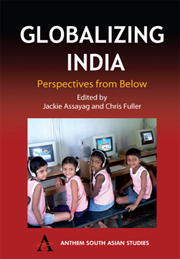1 - Introduction
Published online by Cambridge University Press: 05 March 2012
Summary
To say that globalization has become the global cliché of our time has itself turned into a cliché in academic writing on the subject. By the end of the twentieth century, however, most social scientists, including anthropologists, acknowledged that globalization is a genuinely important topic of enquiry and that – despite its often ill-defined, catch-all connotations – it does label a distinctive transformative process that appears to have taken hold in many parts of the contemporary world, including India.
Definitions of globalization abound, but paraphrasing Held and his co-authors (1999: 14–15), we may initially define it as the widening, deepening and speeding up of global interconnectedness, a spatio-temporal process of change that links local or national social relations and networks with worldwide, global ones and thereby transforms ‘the organization of human affairs’. A particularly important aspect is the ‘deepening enmeshment of the local and global’, so that distant events may have more and more local significance, and vice versa (ibid.: 15). This aspect is one to which anthropologists can particularly contribute, and introducing their volume on the anthropology of globalization, Inda and Rosaldo point out that anthropology ‘is most concerned with the articulation of the global and the local’ (2002: 4), with how globalization interacts with particular societies and cultures, and how ordinary people themselves experience and understand the process.
- Type
- Chapter
- Information
- Globalizing IndiaPerspectives from Below, pp. 1 - 14Publisher: Anthem PressPrint publication year: 2005



